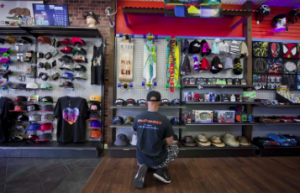
Presented by Paystrubmakr.com ![]() By John Wolf
By John Wolf
Do we fall into no base optimism? Most of the population is influenced by optimism bias. You may say that the people are suffering from having a positive view of the future with no solid base to do so. A question can arise about the use of the definition as suffering; it may be better to use the term positive thinking and determine that optimism is a positive way to view a situation.
Quote from The optimism bias Prop. Tali Sharot
The ability to anticipate is a hallmark of cognition. Inferences about what will occur in the future are critical to decision making, enabling us to prepare our actions so as to avoid harm and gain reward. Given the importance of these future projections, one might expect the brain to possess accurate, unbiased foresight. Humans, however, exhibit a pervasive and surprising bias: when it comes to predicting what will happen to us tomorrow, next week, or fifty years from now, we overestimate the likelihood of positive events, and underestimate the likelihood of negative events. For example, we underrate our chances of getting divorced, being in a car accident, or suffering from cancer. We also expect to live longer than objective measures would warrant, overestimate our success in the job market, and believe that our children will be especially talented. This phenomenon is known as the optimism bias, and it is one of the most consistent, prevalent, and robust biases documented in psychology and behavioral economics.

Optimism Bias.
Optimism bias definition can be done
When you over-predict success and under-predict failure, that’s optimism bias.
Cognitive Neuroscience Professor at University College London, Tali Sharot, defines optimism bias as a phenomenon in which “we overestimate the likelihood of positive events, and underestimate the likelihood of negative events.”
Examples of optimism bias include:
- The idea of getting divorced
- The risk of suffering a car accident
- The possibility of suffering from cancer
Overestimating
- Your life span
- Workplace success
- One’s children
We will review the ways that optimism bias can become a negative issue and affect your business, and some suggestions about how to overcome this negative optimism bias are.
Hiring Mistakes, you can make while hiring
Being a biased optimist can make you lose the understanding of the reality of your workplace. Overestimating your success in the job market can cause you to think that it is hard work that made you successful.
With this in mind, It’s easy to have the idea that if you did it with hard work, another person can work hard and do it. When you meet someone that has no job, you will think that this person did not work hard enough.
You took the optimism and over-estimated your chances of success, and now you project it to another person.
This attitude may cause you to pass up on the right candidate for your job just because this person is unemployed. Another form that optimism bias may take in hiring applies to your skills.
00 Some average full-time recruiters can hire up to fill 54 positions per year. An average hiring manager will hire less.
If you are a hiring manager and you make yourself believe that your hiring skills are highly above average, you may commit a vanity sin and ignore the advice of a practical hiring expert that lives in the real world.
Your optimism bias will make you believe in being a super HR executive. You’re better at hiring than you are, which will impact the quality of your team for the future negatively.

How You Can Fix Your Hiring Failures
- Recognize your problem with optimism bias. It affects you the same as unconscious bias creeps in when you think about race or gender, optimism bias can sneak in the same way and make you believe that you are an above-average hiring super manager. Once you are convinced that it’s possible, that you can think you’re doing better at hiring than you do.
- Consult actual experts. It can be an experienced recruiter or another HR manager who has a good hiring record, looking for advice will help you get a balanced and unbiased decision when you decide between candidates.
- Make sure that you evaluate all the candidates against objective criteria. Having solid reasons and standards will help you to see clearly and can protect you from optimism unconscious biases.
Failures Reflect Unconscious Bias In Your Managing Habits
A 2017 study found that close to half of all small businesses do not last after their fourth year. Are you going to be one of those four-year live span or those who survive and become the successful ones?
Under the influence of your optimism bias, you may believe so. In the case that you ignore the danger of optimism bias, you will not act appropriately to avoid it and end failing.
According Creditdonkey
An estimated 42% of new businesses fall flat due to a lack of demand in the market for the products or services it provides. Lack of funding – Money issues also come into play; 29% of businesses run out of cash before they’re able to get fully established.
Only being extra optimistic with no real support for the need for their product can explain this rate of failure. It may be that some of these entrepreneurs made bad market research or count on the wrong researchers, the other part of failed businesses are those who went after their dreams with a high grade of biased optimism. It is related to mental science and not the marketingOptimism Bias in Small Biz Management- Paycheck Stubs Online and financing theories.

How to Save the Business From Failing?
There are no 100% guarantees for the success of your business, but if you do not offer something that the public loves, you will undoubtedly fail. No one cares about what you love.
For example, you can love your food and think that it is excellent and open a small restaurant offering this ethnic food of you or healthy organic food you believe that people should eat. That is a biased optimism and a baseless business. You should cook some food at home and go out to the street to give it to the public to try, and according to the reaction of the people who tried it, you could take the final decision about what you are going to offer in your restaurant or if you are going to open it or not.
Take yourself far from your dreams by having your eyes opened to reality. Opening a business starts long before you invest in the actual business. Look at the industry you are thinking of joining, Learn about the succeeded and failed to avoid making the same mistakes that those who failed made.
Do not hesitate to spend money on studies and consulting professionals. Your business plan should be made with no optimism bias but on facts that are based on reality.

Optimism Bias And Managing employees.
If you are thinking, “It will all work out,” whenever problems come up, you are in a dangerous optimism that can hurt your business.
Murphy’s law
“whatever can go wrong, will go wrong.”
You can be lucky in part of the time that you were counting on your luck or “your dreams come true,” but reality will mostly hit your face when you have employees that are not capable of doing the right things. Read these articles to learn how to avoid falling with your workforce feedback and performance improvement plans.
If you fall into the illusion that things will always miraculously resolve themselves and that you’ve hired the perfect employees, you got the optimism bias striking your business again.
Nevil Maskelyne, A British stage magician, wrote in 1908:
It is an experience common to all men to find that, on any special occasion, such as the production of a magical effect for the first time in public, everything that can go wrong will go wrong. Whether we must attribute this to the malignity of matter or to the total depravity of inanimate things, whether the exciting cause is hurry, worry, or what not, the fact remains.[5]

How to Avoid Optimism Bias With Your Employees
There is a difference between having a positive attitude towards your workforce and treat your employees kindly and thinking that they can do what they are not well trained or even lake the traits or the skills for it. Hiring the right employees is the same as buying the right tool for the job.
Read Hiring The Right Employee
Before you hire your first employee, create a Handbook. Read How to Write an Employee Handbook, a Tutorial for Small Business. That will give you clear guidelines for everything that your employees should know, from vacation accruals to dress codes.
take advice from an employment law attorney. Let a professional to review and check the handbook for all the legal aspects
Problems will come, you can not avoid it; you are dealing with human beings of different types; you will see the cultural difference that affects your workers and may cause conflicts at the workplace. Do not drag the issue; address it right away.
Do not tolerate negative cases like harassment or other bad behavior like Bulling. Got a bully? Here is what to do.
You can not be “optimistic” when it comes to trouble makers at your workplace. You better take the right measures before you fall into legal cases filed by the victims or losing good employees because your workplace is not protecting them as they are entitled. Do not let your emotions to put your business in danger. Act instantly towards any problem defending your team and your business.

Summary
Dreams are what make us start a business, no illusions, no new ideas. There is an absolute difference between a dream with no real base and a vision of something that has roots into reality.
Some optimism is the base of open eyes in the morning. If you have no positive expectations, you will never start a new business. The problem is ignoring reality, or being too lazy to study the truth about your idea of business. And start a business with not the right information about the industry.
We will keep using the restaurant idea. After that, you found out that people loved your food when you gave it free, you have to see if there are competitors with the same kind of food that do succeed. Then study what is the price that the public will be willing to pay for your food, and what will be your cost, will it be competitive or not?

Let’s assume that you got an affirmative answer to the last questions. People loved your food, and the market price is showing that you can make money with this price. Now your optimism is high, you rent a place for your new restaurant, and you are full of enthusiasm, your dream is coming true. Are you sure? Do you have the money for remodeling and adjusting the place for a restaurant? You may have it or took a loan for it.
Now you are in business, you opened your restaurant, and you are facing a low flow of eaters. Oh! You need advertising, no? Do you have the money to pay adds? Again you will need more money for your dreams to come true. This time you take a loan from your family.
You may survive for two years and reach a dead-end if you have no sufficient money to cross the time a restaurant needs to get enough eaters to make real money.
Making a dream to come true depends on counting in very realistic factors, do not let yourself fall in the optimism bias.
paystumbmakr.com team thanks you for a visit and reading this blog Pays tub online
Learn how to create your pay stub
paystubmakr.com
Disclaimer: John Wolf and paystubmakr.com are making a total effort to offer accurate, competent, ethical HR management, employer, and workplace advice. We do not use the words of an attorney, and the content on the site is not given as legal advice. The website has readers from all US states, which all have different laws on these topics. The reader should look for legal advice before taking any action. The information presented on this website is offered as a general guide only
